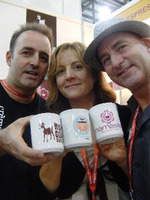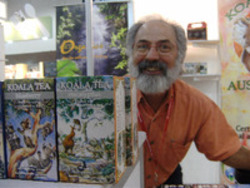Text and Photos By Mallika Naguran
 Holy Goat!Singapore, 27 April 2010. I am sipping a very pleasant chai as I write this. It is an organic ready-mix Namaste brew by Holy Goat Coffee just right for a mug. I picked up a couple of sachets from the young trio team, part of the 150-strong Australian exhibitor contingent at the Food & Hotel Asia 2010 in Singapore.
Holy Goat!Singapore, 27 April 2010. I am sipping a very pleasant chai as I write this. It is an organic ready-mix Namaste brew by Holy Goat Coffee just right for a mug. I picked up a couple of sachets from the young trio team, part of the 150-strong Australian exhibitor contingent at the Food & Hotel Asia 2010 in Singapore.
With a huge serving of hot milk, the tea powder dissolves instantly, and the rich aroma of cinnamon and cardamom among other exotic Indian spices makes me sigh with relief. After all this is the second piece of article I am writing today, feeling like a word factory, and I needed something good to keep me going.
The true goodness of organics does not necessarily lie in the taste though. No Worries tea of organic herbal Koala Tea Company got me fixed on the waft of peppermint, distracting me from the day’s stresses, and wondering if I’d wake up the next day purer than ever. At least from knowing that I played my part in supporting a company that bothered to care about the environment, by drinking its tea.
 Refresh mind and spirit with Koala Tea.Koala Tea Company has a range of teas to suit the need for wellbeing, ailments (real or imagined), including cure for hangovers (I dutifully passed sachets around to my rather margarita-happy friends that night. They sent me messages the next day on Facebook sounding rather sober, so I gather it worked!)
Refresh mind and spirit with Koala Tea.Koala Tea Company has a range of teas to suit the need for wellbeing, ailments (real or imagined), including cure for hangovers (I dutifully passed sachets around to my rather margarita-happy friends that night. They sent me messages the next day on Facebook sounding rather sober, so I gather it worked!)
Before I move on from the topic of taste to something more sensible, I have to say that I was absolutely taken in by the berry and chocolaty sensations of Wild Fox’s 2008 Cabernet Sauvignon. The Australian Certified Organic company based in South Australia produces quite extraordinary wines including the 2009 vintage of Sauvignon Blanc. Both wines have won silver and bronze medals in the 2009 Australia New Zealand Organic Wine Show. And no wonder.
Do organics make products taste better? In the case of Wild Fox Wines, the company believes that their practices enhance fruit and wine quality by harnessing nature’s balance. “It begins with the soil. My father bought over an almond orchard land that was untouched for 15 years and grew grapes instead, all the time caring for the earth by not introducing chemicals such as pesticides or fertilizers,” said Terry Markou.
Wild Fox Wines also contain low sulphur levels, which prevent some allergic reactions that wine drinkers experience such as stuffiness of the nose, rash and headaches. Sulphur dioxide is added to wine making process to inhibit or kill unwanted yeasts and bacteria, and to protect the wine from oxidation.
Additives in food and beverage are often sprinkled on to make them taste better or last longer. While most do not develop an immediate or noticeable allergic reaction, certain chemical compounds do work against natural systems to introduce less than desirable effects. In considering non-organic foods & drinks, consumers should think not just about what it does to their bodies when ingested, but how the environment is affected when remains get washed out into the earth, ending up in waterways that affect wildlife and marine life.
Wild Fox Wines new plans for 2010 is to experiment with preservative-free reds. “Our wines are vegan friendly too,” added Terry, explaining that some winemakers add egg as an extra ingredient to boost taste.
 No jabs, no crap - Australian Organic Meats.Organic meat, I have heard from a few, taste better because of the way the animal is fed and reared – free range instead of being cooped up – with humane slaughter (although vegetarians would argue that even the most humane methods cause pain and distress to a living thing, and they do have a point). Matt O’Leary, President of the Australian Organic Meats, points out that no hormone jabs are given to the cattle or sheep reared to make them grow quicker or fatter.
No jabs, no crap - Australian Organic Meats.Organic meat, I have heard from a few, taste better because of the way the animal is fed and reared – free range instead of being cooped up – with humane slaughter (although vegetarians would argue that even the most humane methods cause pain and distress to a living thing, and they do have a point). Matt O’Leary, President of the Australian Organic Meats, points out that no hormone jabs are given to the cattle or sheep reared to make them grow quicker or fatter.
Moving away from taste, sustainability is another key consideration if you wish to be a true eco consumer. Where food from the seas is concerned, the onus is on us to find out if the fish or crustacean we are about to devour comes from a source that is not overfished or abused, as in the use of destructive fishing methods.
Cleanseas farms the kingfish, mulloway and the southern blue fin tuna in an aquaculture situated in the Great Southern Ocean. Through third party fishermen, permitted quantities from the wild are stocked and harvested in huge enclosures until maturity. This takes the stress off the oceans that is already suffering from the disappearance of the big fish in many parts of the world.
Cleanseas farming is done in an area with high tidal movement ensuring good flow of nutrients, and coupled with their water protection programme, this keeps diseases at bay. The company claims not to use antibiotics and other chemicals to keep fish healthy. Feeds are from natural, sustainable sources and not genetically modified.
According to Gail Spriggs, sales & marketing coordinator of Clean Seas, the company is ISO14001 & ISO9001 compliant, "the highest certification granted with regard to environmental and quality management and awareness. Clean Seas adheres to these strict practises to ensure sustainability of the environment and fishery." Cleanseas is also certified Friend of the Sea for Kingfish and Mulloway for compliance to their criteria for Sustainable Fisheries.
Time Magazine in 2009 voted Clean Seas as the world’s second best invention of the year for the company’s breakthrough in the breeding of southern bluefin tuna.
The company has not applied for the Marine Stewardship Council (MSC) certification though, which is regarded an international and trusted authority on sustainable fisheries worldwide. However, Cleanseas' practices of ensuring the sustainability of the threatened blue fin tuna are laudable. This is because of the increase in consumption of blue fin tuna, in Japan and beyond, in spite of dwindling numbers.
The southern blue fin tuna is classified as Critically Endangered on the IUCN Red List of Threatened Species. Scientists believe that since the 1950s when industrial fishing commenced, the total population of southern bluefin tuna has declined by about 92 percent.
Sustainability – to ensure our future generations have all the goodness we now enjoy - is an important consideration in the food & beverage industry, and Australia seems to be charting a resolute course in that direction.
Austrade’s Team Leader for Food & Beverages to ASEAN, Ross Bray said that Australian speciality foods were increasingly sought after across ASEAN. “Singapore is where the rest of ASEAN looks for the latest trends in food consumption. Australian chocolates, cheeses, meat, seafood and more recently, organic and gluten-free products have built on the remarkable success of our wines into Singapore, and other ASEAN countries are now catching on.”
Now, that I’ve come to the end of the article, let me help myself to another cup of tea, Aussie style. No worries!
More information on South Australian aquaculture industry with regard to wild caught tuna can be found on the PIRSA (Primary Industries and Resources SA) website:
www.pir.sa.gov.au/aquaculture/aquaculture_industry/tuna